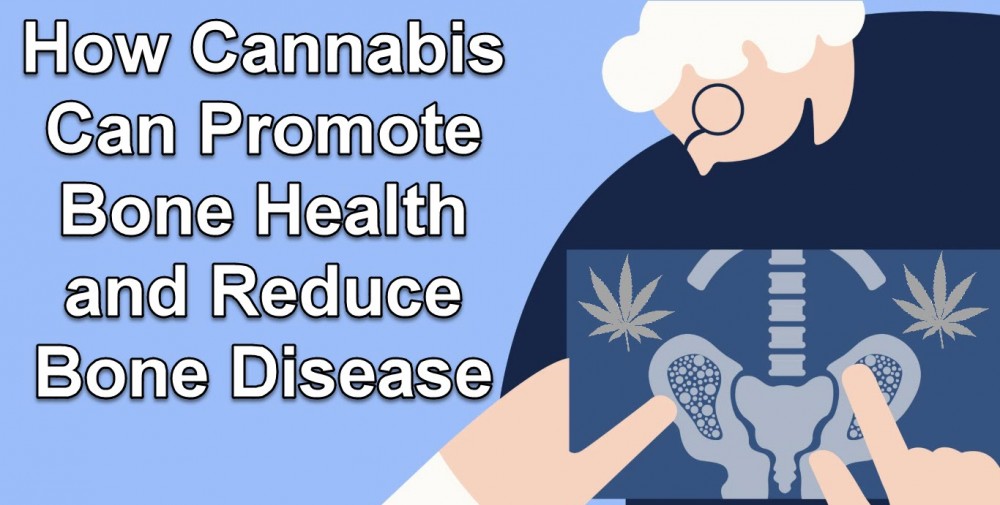With the legalization of medical marijuana, more and more people are becoming aware of the therapeutic applications of cannabis and cannabinoids in treating a wide variety of diseases.
 However, many people aren’t aware of the fact that cannabis can help treat and prevent bone disease.
However, many people aren’t aware of the fact that cannabis can help treat and prevent bone disease.
This is important, as our bones suffer from wear and tear as we get older. We may not notice it, but bone loss is also occurring.
To keep our bones healthy we need an adequate amount of minerals and protein such as calcium, phosphorous and collagen. If we have a deficiency in any of these, it can lead to bone disease.
Common bone diseases such as osteoporosis or osteoarthritis can be very painful and cause a lot of inflammation. With around 200 million people around the world suffering from the excruciating pains and discomfort that comes with osteoporosis, there is a need for an alternative treatment for the mostly aging population that is prone to bone disease.
But it isn’t just the elderly who are prone to bone disease: issues with bone metabolism or defective genes can also mean that some people are born with bone disorders, while others develop it later on in life.
Current Treatment Options for Bone Diseases
The recommendation of supplements such as calcium or vitamin D, on top of a healthy nutritional diet has shown to improve bone health - however this can be slow and a recent study found it only increases bone density from 0.6% to 1.8% - an amount too low to affect fracture risk.
Bone diseases can be very painful and people often take prescription painkillers - these can have harmful side effects, and can lead to tolerance and addiction.
Cannabinoids for Bone Diseases
The endocannabinoid system in our bodies is like a balancing system - always checking that everything is working efficiently and heals us if anything needs to be re-balanced. If it finds a problem it will send instructions to receptors to regulate it. One of the many roles of the endocannabinoid system is to facilitate the healthy growth and strengthening of our bones through the process of bone metabolism. The endocannabinoid system interacts with our immune system, and CB1 and CB2 receptors, that also play a critical role in our bone health.
It is the presence of CB1 and CB2 receptors within the skeleton that has lead scientists to believe that cannabinoids can help treat bone diseases. Cannabinoids look for and activate cannabinoid receptors (CB1 and CBD2).
Research from a study looking at age-related osteoporosis found that the CB1 cell receptor is involved in the bone metabolism and remodeling process. The cannabinoid system seems to regulate how much old bone material is broken down and how much new bone tissue was produced.
In another study researching bone decay in mice, results shown that CB2 cell receptors appeared to balance bone metabolism and in turn slow down age-related bone decay.
Results from a more recent study where rats with broken bones were treated with CBD and THC, found that in most cases fractures healed faster and that the callus size was approximately 26% smaller compared with rats that had not been given CBD or THC.
Heavy Cannabis Might Make our Bones Weaker
We need to also consider a recent study that measured bone density of heavy-cannabis users (who smoked cannabis at least 5 times a day, for the last 25 years or longer) against regular tobacco users. Results suggested that heavy cannabis users had had a reduction in bone mineral density, which causes a future risk of osteoporosis and fractures.
They also found that moderate cannabis users had little to no difference in bone density compared to tobacco users.
Cannabis for Pain
Cannabis use for chronic pain has been well researched with scientific evidence to suggest that the whole cannabis compound has therapeutic benefits - making this a good treatment option for painful and debilitating bone diseases.
Final Thoughts
Sadly we can’t stop the aging process, but with promising breakthroughs in medical research we no longer have to endure the chronic pain from bone diseases such as osteoporosis or osteoarthritis, and although cannabinoids such as THC and CBD may not be able to reverse these diseases, they have the potential to slow it down and improve quality of life.
0 Comment:
Post a Comment